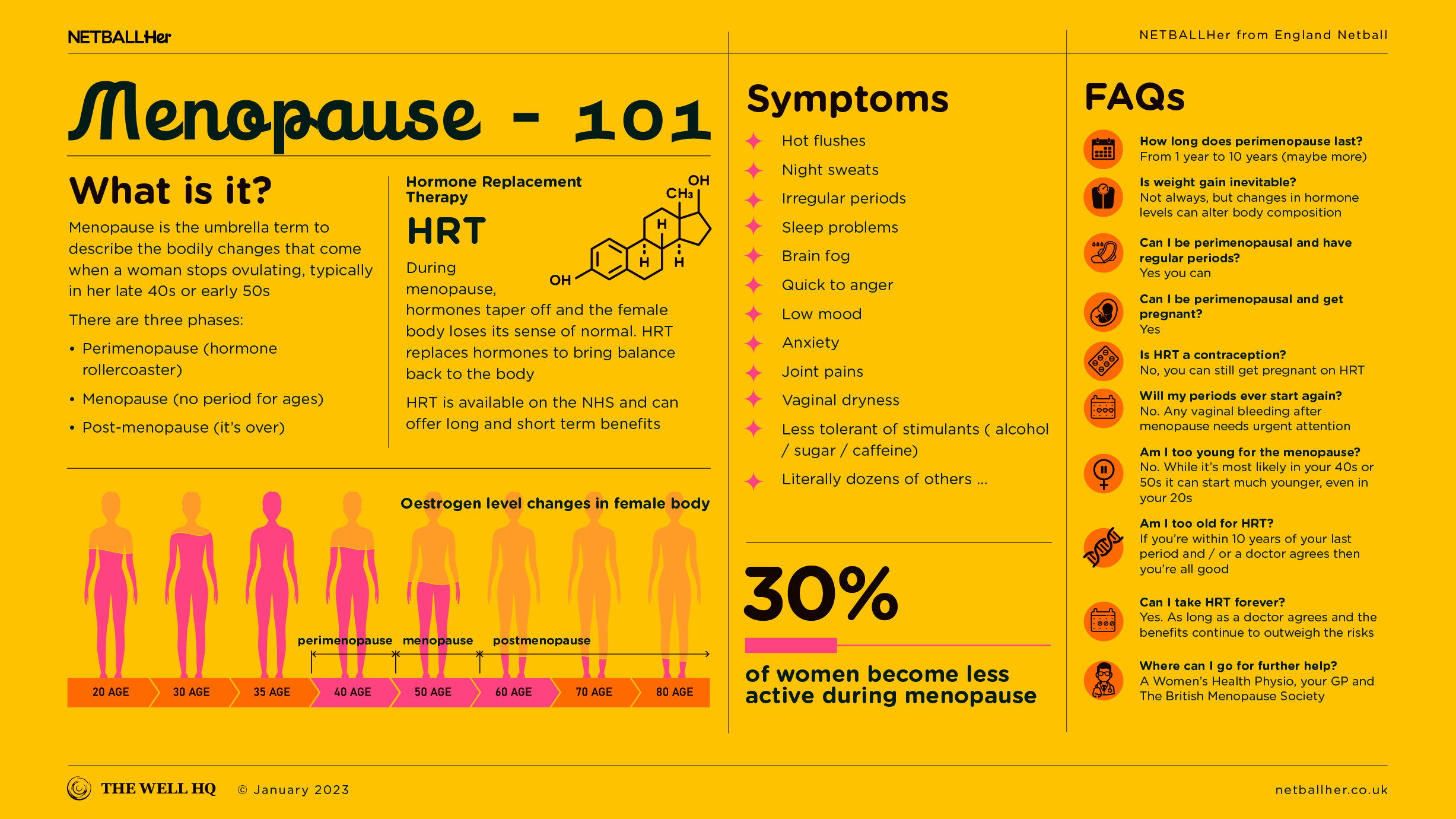Click play for an audio readthrough of this article
What it is and its phases, symptoms and solutions
Truths and terms we’ll need to know sooner or later.
Before your introduction to menopause …
Be sure to check out our article on the tremendous benefits of exercise in midlife. Many midlife women encounter a lack of information, options and support to stay active in midlife. And often the offerings fall into the aqua aerobics and pilates categories. There’s absolutely nothing wrong with these kinds of workouts, but staying active in midlife doesn’t have to be so conservative.
You can exercise, train and compete as a midlife woman.
If you’ve played netball your entire life, midlife isn’t the time to give up it’s the time to do everything you can to stay on court.
What is menopause?
In basic terms the menopause is when you’re ovaries stop ovulating and your periods stop. In medical terms you are defined as being post-menopausal if you’re over 50 and not had a period for a year or between 45-50 and not had a period for two years. There’s actually three kinds of menopause: natural, medical and surgical.
Most common is natural menopause (as described above), medical menopause is when the ovaries are switched off by medication and surgical menopause is when the ovaries are surgically removed.
Natural menopause has three distinct phases:
Three phases of natural menopause
Perimenopause:
Before the hormones of your cycle wind down, they can become erratic. This can cause the onset of symptoms, and women can experience irregular periods. Cycles tend to shorten during the early stage of the perimenopause, and then get longer, with periods less and less frequent as a woman gets closer to the menopause. The perimenopause is the chapter that’s synonymous with the ‘hormonal rollercoaster’, and it can last up to 10 years.
Menopause
The menopause itself is actually the briefest of all three phases. For over 50s, “menopause” is the one-year mark after a woman’s periods have stopped. For over 45s “menopause” is the two-year mark after a woman’s last period.
Post menopause
Post menopause is the time after menopause – ie the rest of your life.
Does menopause experience differ by ethnicity?
We’re learning more and more as menopause research advances, but the short answer to the question, based on early evidence, is yes.
Research suggests that black women are three times more likely to have an early menopause than white women. With that, coaches, teammates and netballers themselves need to be aware of menopause signs and symptoms now, and begin those crucial conversations sooner rather than later, for the sake of the whole team.
Symptoms of perimenopause can significantly impact a player’s experience of netball, but we also know that women, in the years after menopause, are at a greater risk of various health issues, from high stress, to bone and joint pain to pelvic floor issues and even heart disease.
So when a woman goes through menopause early, her risks of these health issues increase earlier in life too.
What are menopause symptoms?
Some women sail through the menopause with no symptoms. Of those who develop symptoms, 25% experience mild symptoms, 50% moderate, and 25% severe.
This list marks common symptoms but there are literally hundreds of others:
- Hot flushes
- Night sweats
- Irregular periods
- Sleep problems
- Brain fog
- Quick to anger
- Low mood
- Anxiety
- Joint pains
- Vaginal dryness
- Crave food-fixes (think alcohol / sugar / caffeine)
- Less tolerant of stimulants (think alcohol / sugar / caffeine)
How is the menopause diagnosed?
A clinician can diagnose the perimenopause (ie the first phase of menopause) based on a woman’s age and symptoms. In other words, if you’re the right age (around mid 40s) and present with menopause symptoms then you should be diagnosed as such without the need for a blood test.
Note that you can be perimenopausal and still have regular or irregular periods. This means pregnancy is still possible.
Don’t be tempted by over-the-counter menopause tests. They aren’t shown to be accurate or reliable when it comes to diagnosing whether you are in perimenopause. There are circumstances where your doctor might take a blood test, but this will depend on things like your age, your symptoms and the medication you’re taking. In the UK, the body that decides on healthcare best-practise is The National Institute for Health and Care Excellence, or NICE.
NICE recommends that women over the age of 45 can be diagnosed on age and symptoms, and don’t need a blood test to check hormone levels.
A menopause diagnosis means it’s time to look into treating and managing symptoms but other blood tests, to check thyroid function or iron levels, may be required to rule out other conditions.
If you’re under 40 then you will be offered a blood test as this may be an early menopause also known as POI, or Primary Ovarian Insufficiency.
As a reminder, the content of the course belongs to The Well HQ. You have permission to access and use the content yourself or, if you are an organisation, for the number of users selected, but are not otherwise permitted to share such content with others, all in accordance with our Course Terms and Conditions.

